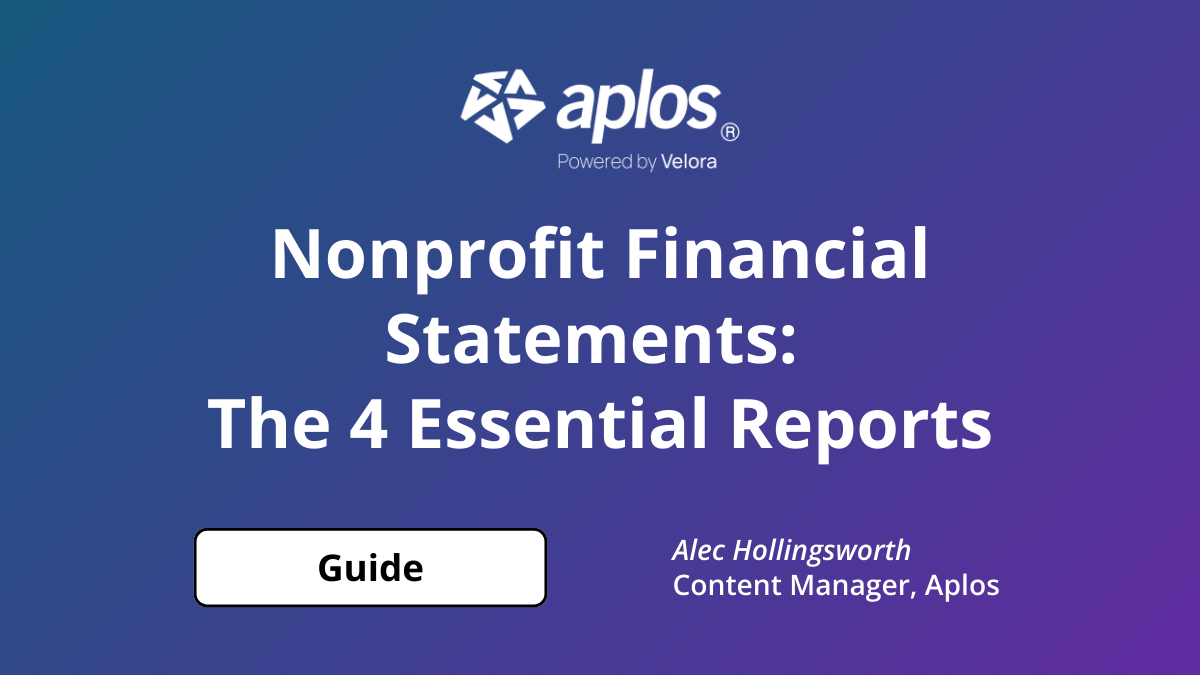
The Roles and Responsibilities of a Nonprofit Founder

Founders play a special role when it comes to the birth and success of a nonprofit. They bring passion, energy, and vision to the mission, which can spread like wildfire throughout the organization.
There are often questions from inside and outside the nonprofit community about the role and responsibilities of the founder once the organization has been started. This article will delve into those questions in an effort to clear up the confusion.
Learn how Aplos can make your nonprofit run more efficiently. Try it free for 15 days.
What Is a Founder?
In this case, the founder refers to an individual who establishes a company or institution. More specifically, for the purposes of this article, the founder refers to the person who created a nonprofit organization.
Does the Founder Have a Title?
The founder or founders of a newly formed nonprofit typically hold the position of Board President or Chairman of the Board (often referred to as just “Chairman”). The founder’s official title and role can change depending on the needs and desires of the board.
The Overall Role of the Founder
The general role of the founder is to manage day-to-day operations, organize fundraising efforts, and secure funding as needed. It is essential for the founder to keep a sharp eye out for potential risks to your nonprofit and implement strategies to mitigate those risks. If and when an Executive Director is hired, it is common for the founder to hand over the reins of these responsibilities to this individual.
The founder is often tasked with leading the nonprofit and is perceived by the board members to be the leader of the organization. Typically, the Executive Director’s role depends on the nonprofit board culture and relies heavily on whether the organization has set out its mission.

Main Responsibilities as Founder
It is the duty of the founding head of a nonprofit organization to establish the vision and strategic direction of the organization. The role also includes ensuring that all the necessary administrative tasks are running smoothly.
Some of the responsibilities as founder or chairman include:
- Board member selection
- Laying out the role of the board members in setting policies for the organization
- Implementing the policies the board members have set for the organization’s activities
- Approving annual operating budgets (unless stated otherwise in the organization’s policies)
- Determining salaries of staff
- Approving contracts
- Approving major expenditures that impact the organization’s finances
- Overseeing the organization’s finances
- Representing the interests of the organization to the public, donors, and others
- Overseeing the work of committees of the board
- Supervising and monitoring the work of outside professionals and consultants
Note: Many of the duties listed above are often handed over to the Executive Director once he or she is in place.
Leading with Purpose
Leading a nonprofit with a clear and focused purpose is essential for achieving its mission and ensuring long-term success. Purpose-driven leadership involves understanding and articulating the organization's core mission, values, and goals, and aligning all activities to reflect this central purpose. This approach not only guides strategic decision-making but also inspires and motivates staff, volunteers, and stakeholders to work cohesively towards common objectives.
👉 If you want to better understand what truly inspires people to give and stay engaged, Keela’s Donor Psychology Guide is a practical resource worth exploring.
By prioritizing purpose, nonprofit leaders can create a culture where every action and decision is evaluated based on its alignment with the organization's mission. This ensures that resources are utilized effectively and that the organization remains focused on its primary goals, even amidst challenges or changing circumstances. Moreover, leading with purpose fosters trust and credibility among supporters and the communities served, as it demonstrates a steadfast commitment to the organization's foundational values.
Incorporating purpose-driven leadership also involves engaging the board of directors in embracing and promoting the organization's mission.
Common Questions Related to Founding a Nonprofit Organization
Does the Founder Own the Nonprofit?
While many assume that the founder is by default the owner, there is no legal way for anyone to actually have full or partial ownership of a nonprofit. There are no shareholders or shares of stock, and due to its non-commercial purpose, a nonprofit organization is strictly monitored and prohibited from operating in a manner that produces a profit for an individual or individuals (ownership).
Does the Founder Get Paid?
From a legal standpoint, founders are not allowed to make a profit or benefit from the net earnings of the nonprofit’s efforts. However, there are other ways founders can be compensated by the organization.
Can the Founder of a Nonprofit Get Fired?
The founder of a nonprofit organization can be fired if his or her actions are not approved by the board of directors or shareholders, or if the actions of the founder cast a negative light on the organization. For example, the board of directors can fire the founder and appoint a new person to serve in that role if they wish to do so.
Tools for New and Growing Nonprofits
Starting a nonprofit to achieve a particular mission is a worthy and admirable endeavor, and any individual who chooses to take on this challenging task should be commended. Between choosing a board, setting up board meetings, settling on an annual budget, and creating and implementing your organization’s marketing plan, the founder has their fingerprints all over every aspect of the nonprofit’s activities starting from day one.
Fortunately, Aplos has created nonprofit management tools that are specifically designed to address the unique needs of your day-to-day operations. Over 40,000 organizations trust Aplos to streamline their activities, saving time and money in the process.
Frequently Asked Questions
What is a founder?
A founder is the individual who created your nonprofit organization.
Does the founder have a title?
Founders typically serve as Board President or Chairman, though titles and roles can change per the board's needs.
What are the main responsibilities of a founder?
Founders set vision, manage operations and fundraising, oversee finances, select board members, and approve budgets and major expenditures.
Can the founder be paid or compensated?
Founders cannot profit from a nonprofit's net earnings, though the article notes there can be other ways the organization compensates founders.
What tools does Aplos offer for nonprofits?
Aplos provides nonprofit management tools for day-to-day operations; over 40,000 organizations trust Aplos to streamline activities.

Our comprehensive closeout services start at $399 per month that needs to be reconciled. Sign up before Jan 1st and pay just $199.50 per month!
Copyright © 2025 Aplos Software, LLC. All rights reserved.
Aplos partners with Stripe Payments Company for money transmission services and account services with funds held at Fifth Third Bank N.A., Member FDIC.
Copyright © 2024 Aplos Software, LLC. All rights reserved.
Aplos partners with Stripe Payments Company for money transmission services and account services with funds held at Fifth Third Bank N.A., Member FDIC.



.png)



